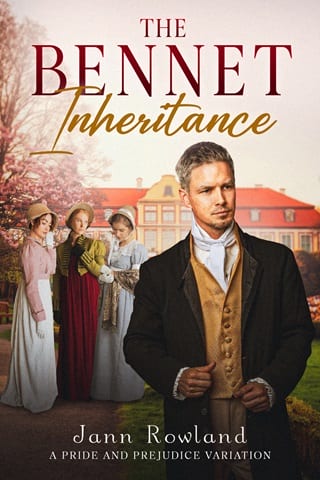Chapter XXXVII
S everal expectations played out in the ensuing days, weeks, and months, though there were a few events that were not at all expected. Mr. Bennet carried his point about his wedding and that of his two eldest daughters by the simple expedient of marrying with what some might call undue haste. While it led to a few whispers and tittle-tattle in the neighborhood, Bennet disarmed all these with a few clever comments and statements that carried enough home truth that the neighbors could not misunderstand.
? "I am a man with full-grown daughters who is marrying a lovely young woman," he would say. "As she is not a new debutante herself and does not wish to wait, we see no need to delay and every reason to marry at once. I am not getting any younger, after all."
? Some of the sillier ladies with an affinity for gossip still tittered about the wedding, which happened a mere month after they announced the engagement, but the gentlemen accepted this explanation with knowing nods and hearty congratulations. Mr. Bennet found himself subjected to so many comments about his vigor among innuendoes about the benefits of marrying a much younger woman that he could only reflect on the rambunctious and sometimes indecorous nature of men. There was little enough reason to take offense, so he endured all these comments with grace, changing the subject when necessary or taking himself from their company when his patience slipped.
? The other two couples in this tale waited another two months after Mr. Bennet's wedding to solemnize their unions; it should not take any greatness of mind to understand the trial on all their patience, especially after witnessing the Bennets' felicity. Good and moral people that they were, they endured the wait, and Darcy lightened the atmosphere many times by reminding them that sometimes couples waited three or four times as long for their nuptials.
? When the day came for the double wedding of the eldest Bennet daughters, neither cared that the season had descended into autumn and gray skies accompanied a stiff wind that reddened cheeks and ruffled dresses and displaced a few top hats. The company was far too happy to allow such extraneous matters to concern them, not when there was so much joy to celebrate.
? As the elder Bennets had spent only a week on their wedding tour—Bennet promised his wife they would enjoy a more extensive holiday the following summer—Jane and Elizabeth Bennet lived with their new mother for several weeks before quitting Longbourn for the homes of their new husbands. By virtue of her unattached state, Mary stayed with them for a full three more years, in which she grew as close to the new Mrs. Bennet as any young woman can boast. When Mary resigned her right to the Bennet name, her alliance proved the most advantageous of the three sisters, her husband, a friend of Mr. Darcy and Mr. Bingley, was a baron. Lord Hardwick's estate was in Northamptonshire, near the path taking the Darcys from London to Pemberley.
? For Jane's part, her husband decided at length that he would not purchase Netherfield, as the estate was not enough of a challenge to his abilities. With Mr. Darcy's aid, he found an estate for purchase in Nottinghamshire, on the border with Derbyshire, and about halfway between Pemberley and the Bennets' former home in Woodborough. With the Darcys and the Bingleys in the north and the Bennets remaining in Hertfordshire, in time Mary's home became a natural gathering place for the extended family, and they spent many joyful days together at her estate.
? Georgiana Darcy was not to be long outdone by Mary, for she wedded a gentleman of excellent reputation and fortune, settling in Oxfordshire with her husband. Her husband, a Mr. Ramsay, became an excellent friend to the other gentlemen, and if his estate was not so convenient a gathering place as Lord Hardwick's, Georgiana also put her home to good use hosting her family when the occasion allowed.
? Of the other characters in our tale, several are notable in the events that occurred after—and even before—the double wedding. Lady Catherine, as any reader of any acumen might expect, received word of Mr. Darcy's engagement to Elizabeth Bennet poorly, though to say that was to be accused of excessive understatement. Fortunately for all concerned, Mr. Darcy prevented her descent upon Longbourn in fire and fury by the simple expedient of visiting Lady Catherine and informing her of the event in person. The specifics of their conversation Darcy never betrayed to his wife and said little to Mr. Bennet or anyone else. For a time, all contact between them ceased, though that state did not last long enough for his liking. After a time, Lady Catherine grew curious about the new Mrs. Darcy and deigned to visit her, offering copious advice as was her custom. Elizabeth, of course, listened and resolved to do as she thought best, and if Lady Catherine noticed this lapse, she never mentioned it.
? In contrast to her mother, Anne de Bourgh expressed her pleasure to her cousin and his new wife whenever the occasion permitted, which was not often in the early years of their marriage. To Mr. Darcy's great surprise, having thought that her ill health prevented his cousin from entering the marriage state, Anne de Bourgh married a Mr. Ashdown several years later. It was a marriage born in felicity, or so Anne herself informed them, and if Lady Catherine did not achieve her dearest wish of uniting her nephew and her daughter, she grew at least content with Anne's situation.
? Mr. Collins took on the responsibilities of the parish around Longbourn, and to Mr. Bennet's satisfaction proved himself a capable shepherd of the flock. In time, under Mr. Bennet's guidance, he grew to greater confidence and less verbosity in his speech, though he never quite shook his habit of excessive deference and wordy compliments. Mr. Collins married a young lady of the neighborhood and lived in felicity with her throughout the days of his residence at Longbourn parsonage, raising several children who grew to be excellent people themselves.
? Miss Caroline Bingley, who assumed the title of Miss Bingley upon her sister's marriage, did not long possess that moniker. Even before the double wedding, Miss Bingley accepted the proposal of Mr. Lucas. Colonel Fitzwilliam, who had suggested to Darcy that he might give thought to her as a potential wife, had no opportunity, for he was called back to London by his general soon after resolving the business with Mr. Wickham. Yet the colonel found no reason to despair, for he found an heiress and lived in felicity ever after. Returning to Miss Bingley, her engagement surprised and concerned her siblings, though it was the new Mrs. Bennet who took on the task of confirming their sister's future happiness.
? "There is no need to concern yourself for me, Louisa," said Caroline, her manner suggesting she had expected the inquisition. "I am more than content with my future husband and situation."
? Mrs. Bennet regarded her sister for some moments, considering how to ask what she most wished and tactfully. In the end, she decided it was best to state her concerns without artifice.
? "Caroline, pardon me for speaking thus, but I wish to understand. Since we entered London society, your every thought was to marry into wealth and standing, if not to Mr. Darcy himself, then to some other man who could fulfill that desire. Will you be happy in such a marriage with a man who cannot even boast a presence in town, who possesses an estate even smaller than my husband?"
? "Perhaps I have learned what is important."
? The demanding gaze with which Mrs. Bennet regarded her sister soon provoked a response.
? "The business with Mr. Darcy has... disillusioned me to a certain extent, as has his account of the business with Lady Catherine. Should I provoke such a man to offer for me I might attain all I ever dreamed, but I suspect there will always be naysayers. I will not have that issue with Mr. Lucas.
? "I have some esteem for him and expect contentment in my future life. I am not like you, Louisa. You love your husband to distraction. However, I was never a romantic. Mr. Lucas is a good man who will bring me fulfillment in life. As we will join in this endeavor, I believe we shall do well, and my dowry will help raise his consequence. Perhaps it is not what I wished to acquire, but I find such things are no longer as important to me as they once were."
? "Is that all?"
? Miss Bingley sighed and shook her head. "You remember when Lord Winchester came across my path when he called on Charles and Mr. Darcy?"
? Mrs. Bennet recalled the incident well, a frisson of unease working its way up her spine.
? "He was not explicit in what he said, but he made it very clear he would not object to knowing me better. As I do not doubt just what such an acquaintance would entail, I wish to put myself forever beyond his reach. You should not suppose that I accepted Mr. Lucas based on that alone, but I will own that it was part of my reasoning."
? With this explanation, Mrs. Bennet was content, for her sister refused to say anything more; she did not trouble herself to approach Caroline on the subject again. In future years, the sisters enjoyed much felicity and comfort in their situations so close to each other, and the extended Bennet, Darcy, and Bingley families often included the Lucases in their gatherings. Caroline provided Mr. Lucas with several children, including two sons, and Sir William, the proud grandfather, was known to extol upon the virtue of his son's wife and his new grandchildren. Sir William was an effusive and civil gentleman, one the new Mrs. Lucas found trying at times, but she always paid her husband's father every appearance of respect.
? Mr. Lucas's sister Charlotte, who had become such an excellent friend of the Bennet sisters, married her gentleman and settled in marital bliss at his estate. In future years, she provided him with more children, which proved a blessing as Mr. Herridge's son was taken from them after an illness of scarlet fever. Though the event was tragic, and Charlotte had grown close to her husband's children from his first marriage, she was at least comforted in her ability to provide her husband with an heir to carry on his name and his family's heritage at the estate.
? As for the principals of the story, their families grew over the years, children soon arriving, all of whom grew close. The Bennets' children, though they were from the previous generation and aunts and uncles to the other children, remained close to their nephews and nieces ever after. Elizabeth birthed five children, her eldest, Bennet, being the heir to his father's holdings, and Jane had six, her husband's heir proved the last child. Mr. Bennet often jested with his son that now he felt something akin to what Bennet had felt in a house with a wife and three daughters since Bingley now had five .
? In his second family, as some might call it, Mrs. Bennet gave birth to two daughters, Catherine and Lydia, before she presented her husband with a son to carry on his name at Longbourn. Mr. Bennet's heir was aptly named Joseph after his father. Thereafter, Bennet's joy was full when they welcomed two more sons and a daughter besides. Mary and Georgiana had three and two children respectively, adding to the brood that joined their elder cousins and other relations in their frequent gatherings. Life was not always joyful, for into every life a little hardship must enter. Yet they weathered the darker times and looked forward to a better future, and none of them thought they had cause to repine.
? Of the few villains in the tale, there was not much to say. Mr. Wickham departed on a ship for Van Diemen's Land under the auspices of Lord Winchester, and he never returned to England's shores. Whether he ever paid off his debts and earned his freedom no one knew, and the earl never said, though Mr. Darcy knew he received periodic updates about Mr. Wickham's status. As for Mr. Philips, he remained the solicitor in Meryton for the rest of his life, passing the business to his clerk—who did not approach Mr. Bennet for help in finding a new position—when he grew too old to continue the work. As Mr. Bennet never spoke to him and laid eyes on him only infrequently, he knew nothing more than this. This situation suited both men well.
? In time, Mr. Bennet grew to respect and thank the elder Mr. Collins for his repentance, and his determination to right a wrong he had committed many years before. In this, he proved himself the better man, a man worthy of his previous calling, for he learned to forgive and hold to charity for the man who had returned his family's legacy to him. No lesson could have been of more importance to a good man, and Bennet did not hesitate to accept it and live his life by what he had learned.
The End
 Fullepub
Fullepub 



